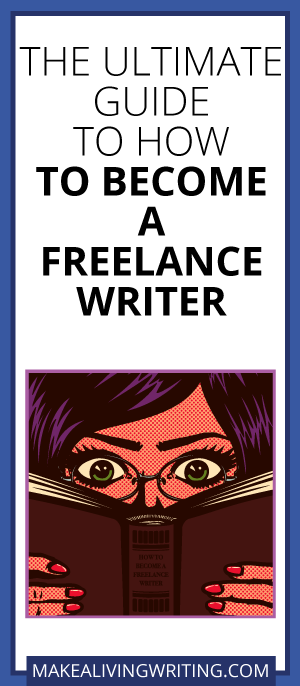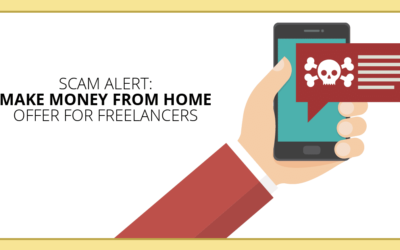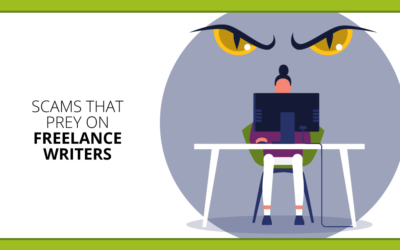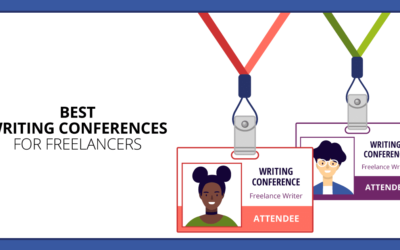
At the start of the year, my email inbox fills up with questions about how to get started in freelance writing. Rather than try to answer them one at a time, I’ve created an ultimate guide below, that walks you through all the common questions and gives you everything you need to know to get out there and start getting paid as a freelance writer.
Ready? This guide takes it step by step, with sections for each topic. It’s got a breezy, Q&A format, to make it easy to read through and quickly move forward with your freelancing goals.
Want a copy of the whole answer sheet? Grab your PDF copy.
Ready? Let’s get you started in freelance writing:
Table of contents: How to Become a Freelance Writer
- Big tips
- Mindset first
- Set up your business
- Decide who you will serve
- Create an online presence
- Build your network
- Get samples
- Decide what to charge
- Find first paying clients
- Avoid scams
- Do the writing
- Deal with clients
1. Big tips
If you don’t have time for the long Q&A, let me give you a few top-level insights that should help calm your worries:
- Freelance writing is a real, viable career. Not a myth.
- There are no hard-and-fast rules in freelancing — experiment and see what works for you.
- There are no ‘going rates’ — every client situation is different.
- You don’t need ‘credentials‘ or to be an expert.
- No one can predict how much you’ll get paid to write, or how quickly. It’s up to you.
- You don’t need ‘contacts’ — you can write your way in the door.
- The answer to many of your questions is, ‘It depends.’
- Take your goals seriously — even if others in your life don’t.
- Don’t worry about finding the best apps or tools to use in your freelance biz. Instead, focus mostly on getting clients.
- In general, fiction, poetry, and personal essays are not the basis of a bill-paying freelance career (you can get paid to write poetry, but don’t expect it to be a full-time career). The money is in reported articles and writing for businesses.
- Pitch more and worry less about whether you’re ‘doing it right.’
- To make this go faster, find a writer community and ask peers what works.
With all that in mind, let’s dig into the nuts-and-bolts of launching a freelance-writing career:
2. Mindset first
The number one thing that stops aspiring freelance writers is their own fears. It won’t matter what nuts-and-bolts knowledge you have, if you’re too scared to go out and get clients.
So let’s bust those fears first!
Q: How do I know if my writing is ‘good enough’ to earn a living?
A: Ultimately, you’ll only find out by writing for clients. But if you’re truly a bad writer, you don’t usually try to make it your career. The problem generally is lack of freelance marketing, not lack of writing craft.
Q: How can I get over my fears of failing as a freelance writer?
A: Start taking action. The more actions you take, the more you’ll build confidence. All writers make mistakes. The thing to know is, it’ll be OK.
Q: What if I have trouble making myself do the marketing work?
A: That’s why you need an accountability buddy — find another freelance writer newbie you can call weekly, to keep you working on your goals. In my experience, newbies with a buddy have a much higher success rate than newbies with no buddy.
Q: How do I get started when I don’t feel qualified?
A: This worry stems from thinking you need to know something besides how to write well, to become a freelance writer. You don’t. You can ask experts, research, and learn things. Your strong writing skill is what you bring to the table.
Start with something you know and feel confident in (more on this below in section 4).
Q: What if I’m an ESL writer and want to earn writing in English?
A: Wish I had good news here, but with changes Google has made, that’s increasingly difficult. There may be easier ways for you to earn online than writing.
Q: What if no one takes me seriously?
A: If you take yourself and your writing career seriously, others will, too. Not kidding.
Q: What if I totally screw up an assignment?
A: You will live to write another day. Ask me how I know…
3. Set up your business
Q: Do I need to register my business?
A: No one can make you, but it’s a real good idea. If you want to write off your business expenses, being registered with state and city tax authorities helps convince the IRS (or your national tax body) you’re a real business.
Q: What should I name my business?
A: Just starting out, your own name is fine. You can always choose another name later, or ‘do business as’ another name. For instance, TiceWrites is my business name, but I do business as Make a Living Writing, Freelance Writers Den, and more.
If you want to be fancy and have serious branding for your freelance writing biz, I recommend choosing a name with keywords that would help clients find you, like: “Healthcare Writer Dana.” Avoid meaningless words and phrases such as ‘communications’ or ‘solutions,’ that don’t really say what you do.
Q: Can I use a fake name in freelance writing?
A: Not usually, no. Noms de plume are for fiction authors. You’ll need to reveal your real name when you get paid to write, anyway — and having a fake identity will make editors wonder what you’re hiding. There’s a legit exception to this if you’re a woman with a stalker…I’ve known people in that sitch, and editors do understand. But otherwise, no.
Q: Do I need a separate checking account for my business?
A: Yes. Just get one. You can thank me later for sparing you endless hours trying to keep your business and personal expenses/income separate.
Q: Do I need to become an LLC or corporation to be a freelance writer?
A: No. I operated as a sole proprietor for many years. An LLC does provide a layer of liability protection between your personal assets such as a home or car, and your business. If you don’t lie or make stuff up, you’ll likely never be sued, so it’s not a big concern, especially just starting out.
Q: What tools do I need for running my business?
A: Beyond a computer and the Internet, the rest is optional. I kept a paper income/expenses ledger for years — but if you want to be more pro, choose a solution such as Freshbooks (which I use and recommend) or Harvest. As I mentioned in the Big Tips, most would-be freelance writers spend way too much time wondering if they need a grammar app, and not enough time trying to find clients.
Q: What do I need to know about taxes?
A: Not much, the first year. You’ll just pay what you owe, end of the year. Set aside a portion of your freelance income for taxes that’s similar to the tax bracket you had last year, as a guesstimate. In the U.S., once you hit the level of owing $1,000 or more in annual tax as a self-employed person, you’ll make estimated quarterly tax payments, based on the previous year’s income.
Q: What about health insurance?
A: If you’re leaving a job and taking the plunge into freelancing, you’ll want to make sure you have health insurance. The good news is there are numerous viable self-employed health insurance plans available for freelancers.
4. Decide who you will serve
Q: Do I need to choose a niche for my business?
A: Only if you’d like to make this launch process quick and easy. It’s hard to market yourself as a ‘freelance writer,’ because that’s so broad. Clients aren’t searching for that — they’re searching for a freelance technology writer, or a Dallas healthcare writer, or something like that.
They want to know if you write their type of thing, so the broad approach often attracts zero clients. Being a generalist also makes it harder to build expertise and raise your rates.
Q: What is a niche?
A: Good question — What I mean is an industry, such as healthcare, software, finance, marina management, metal-smithing. Think of these as niche verticals.
You could also niche horizontally, meaning you specialize in one type of writing, like only case studies or blog posts. I don’t recommend going this route, as a newbie. It’s much harder to get enough clients when you limit yourself to a single type of writing, and easier when you’re a utility player with knowledge of a particular industry sector.
Once you’re established and are turning away offers, you can become someone who does only one type of writing. Until then, focus on industries of interest and write whatever clients need — that’s the quickest way to get this going.
Q: How do I know what a good niche for me would be?
A: Your easiest, best-earning niches generally lie where your experiences and interests intersect with a lucrative topic or industry.
Not sure whether your niche idea would work? Ask yourself, “Who would the big-money clients (or publications) be in this niche, that would pay great rates and have steady work?”
If that question is hard to answer, it’s probably not a great niche. If you’re unfamiliar with the writing marketplace, you’ll want to join a writer community where you can ask around and learn from working pros.
Q: Do I just choose one niche?
A: Actually, I advise choosing 2-3. Staying a bit diverse will help keep your business thriving as the economy and individual industries wax and wane.
Q: Isn’t it bad to turn away clients who aren’t in my niche, when I’m just starting out?
A: Weirdly, it isn’t. Writing for everyone and anyone makes your career very scattered, and it’s hard to get any traction. Like they say, ‘the riches are in the niches.’ Focusing your writing on a few topics will help you quickly gain expertise and impress clients.
Q: What if I super-hate the idea of choosing niches, and I want to stay a generalist?
A: Hey, it’s your business to run — I’m just trying to make this succeed quickly.
One other way to niche your business is by geography. You can market yourself as a Dallas Freelance Writer, for instance. If you’re in a mid- to larger-sized city, this can also work, if you like working with local clients.
5. Create an online presence
Q: I know I need somewhere online people can find me — but as a broke newbie, what can I do?
A: Use your LinkedIn profile (here’s my tip-sheet on how to optimize your profile). Yes, once you get rolling, a writer website will be much better. But for now, you can go a long way putting your portfolio on LinkedIn. You can add clips to Experience entries, and also in your Summary.
Q: Why not just put clips on Contently or an Upwork profile, or somewhere like that?
A: Mass writer sites have a reputation for low rates — and their platform makes it easier to browse through others’ portfolios than to find your contact info. By contrast, LinkedIn is a huge platform where great companies are searching for freelancers, every day. I think it’s a better place to look pro.
Q: What if I don’t have a byline on my clips, like with copywriting work?
A: You can still use your clips in your portfolio, as long as you didn’t sign a nondisclosure agreement that swore you to secrecy that you authored the work.
Q: What if my clips are too old?
A: There’s actually no such thing. You’ll be surprised how seldom prospects care about the age of your clips — they just want to read your work. If you have old print clips that aren’t online, see if a good print shop can create a PDF for you, where the article is readable.
Q: What if I want to do a writer website now, as a newbie?
A: Great idea! Makes you look more professional. And the secret is, the copy you write on your writer website is a writing sample. It can be your first clip. You can get good web-copy jobs from writing your own terrific site copy!
Q: What if I have a blog — can I use that as my writer website?
A: It’s not ideal, unless your blog is very successful and popular. Then, you can put a ‘hire me’ tab up and solicit writing jobs there. A writer website is a stronger way to present yourself, where the Home page is all about your client and the services you offer, rather than an ever-changing set of blog post headlines.
Q: I’m not very technical. How can I get up a good writer website?
A: WordPress is the dominant website platform by far, and I recommend using it because it has the most available designers, tools, and plug-ins to help you make it look great. (I’ve also seen decent sites on SquareSpace, and recently, one on Wix).
I don’t recommend writers learn to create websites from scratch — don’t have to become a coder here! Because many new freelance writers struggle with getting their websites done, I basically begged my designer to create FolioSetup (yep, that’s my affiliate link) — check it out if you’d like ready-made templates, hosting, help, and a quick solution.
6. Build your network
Q: This is all great — but how do I actually get freelance writing clients?
A: One great way is to start building a big referral network, and letting people know what sort of writing client you want. Don’t have a network? Build one! You can do that through in-person networking in your town, or virtually, through online groups such as the interest groups on LinkedIn.
Q: Who do I want in my network?
A: A mix of other writers, related service providers such as designers, editors, and photographers, as well as prospective clients, or people who would know your prospects.
Q: What do I say at in-person networking events?
A: Ask people to tell you about what they do, and who their ideal client is, so you can refer them. They’ll probably ask you the same. Have a little ‘me’ speech prepared to introduce your freelance writing services.
Q: What if I’m really shy and don’t like big groups?
A: You can do one-on-one meetups for coffee or after work, or hop on short phone or video calls. Doesn’t have to be big meetings!
Q: How do I ask for referrals?
A: Big tip: Make it mutual. Ask contacts if they are looking for referrals, and if so who’s their ideal client. Then, tell them yours, and that you’d appreciate their keeping an ear out for anyone who needs your type of writer.
Q: How do I build my network online?
A: I love LinkedIn for that — you can import your rolodex, send connection invites to people who Viewed My Profile, or join Groups and then invite group members to connect. You can look for LIONs (LinkedIn Open Networkers) who connect to all comers, and use LinkedIn’s ‘Discover’ listings to find more people who might be good contacts.
Once you’ve connected, ask how you can help. Share and comment on their content. Send them articles that might interest them. Hop on a Skype call. See what you can do to get to know your connections better. The more you stay on their radar, the more likely they’ll remember to refer you when they hear about a writing need.
7. Get samples
Q: How can I get clients when I don’t have any samples yet?
A: The easiest way is to go out and get some samples. This is also known as working pro bono. You’ll want to choose publications or companies to work with who will give you great samples in your chosen niches.
Define a limited project, and get a testimonial to go with your sample. Boom! Once you’ve got 4-6 of these, you’re ready to impress paying customers.
Q: Is guest posting a good way to get samples?
A: It can be, especially if it’s on a popular site. If you’re posting free for exposure, be sure to choose your sites carefully, and appear where your clients might see your byline.
Q: What about writing for content mills, as a way to get first clips?
A: I don’t recommend it, even for those struggling to land entry-level writing jobs. The requirements of mill work are very different from what you’ll be asked to do in well-paid client work, so it doesn’t serve as a very effective training ground. Often, you don’t end up with clips you can use — they’re ghostwritten for an end client who isn’t identified. Also, mills can be capricious about who they ban or give crummy ‘ratings’ to. You’re basically not in control of your career.
Meanwhile, the tiny pay makes you wonder if you could earn a living writing very fast on there…and the answer is no, you usually can’t. But writers get stuck writing for tiny pay in mills, for years on end. Mill work is also fading away, as there’s less call for short, dashed-off, SEO-keyword-stuffed content, because Google doesn’t like that anymore. So it’s increasingly a dead-end street.
By contrast, doing pro bono work for small publications or small businesses for your first samples gives you clips that impress, and keeps clarity that you can’t earn this way and will need to move up. It also gives you real-world experience writing for the exact types of clients you want.
Q: What about using posts from my own blog as samples?
A: It’s better than nothing, but not ideal. Clients know you didn’t have to please an editor or marketing manager and could publish whatever you wanted, so it doesn’t exactly impress. But if you write kick-ass headlines and get a lot of comments and shares on your blog posts, it could help you lure those first clients.
Q: Does it matter if the sample I do is for a relative or friend?
A: Not really. If they’ve got a small business, an e-commerce site, or edit the hometown paper, go for it!
8. Decide what to charge
Q: How do I know what to charge my first clients?
A: There are a few ways to figure this out. First off, if you’re writing for a publication, they may have set rates and tell you what they are.
If not, you can ask clients what their budget is — and sometimes, they’ll tell you.
If their lips are zipped on that, you can ask around that network you’re building, to learn about typical rates. You can also calculate your daily rate, and simply charge what you need to, to pay your bills and maintain the lifestyle you want.
Big tip: Don’t worry a lot about pay rates in your early days. It’s more important that you get to work for good clients in your niches, and build your portfolio. You can just keep raising your rates as you go, until they’re where they need to be.
Q: Should I charge by the word, hour, page, or project?
A: Ideally, you want to charge by the project. Project rates are especially great for newbies, because then your client won’t be penalized if it takes you longer to write than a more experienced writer. They’re what pros do — we’re not hourly clerks, as writers.
When you work on project rates, you will automagically increase your hourly rate over time, as you become more efficient and take less time to write. And your client will never be the wiser. So yeah. Project rates all the way.
Q: What’s a good average hourly rate my freelance writing should work out to?
A: As a newbie, try to shoot for at least $25-$35 per hour with first clients. Less will mean you’ll never earn enough to stay afloat. Aim to rapidly raise that into the $50-$75 an hour range, and keep moving up from there. Experienced freelance writers earn $75-$100 an hour and more.
Q: How do I know how long it will take me to do projects?
A: By tracking your time. Lots of free software out there for that. Figure out how long it takes you, and then challenge yourself to get it done faster on the next project. Keep improving!
9. Find your first paying clients
Q: How do I find my first clients?
A: There are two basic approaches — you can look in your town for clients in your niche, or you can look online. Look at the online presence of businesses you like, go talk to owners, and propose a project to help get them more clients.
If you’re in a small town or not in the same country as your prospective clients, you’ll be looking online. There are plenty of blogs that offer unpaid guest posts, and many that pay for guest posts.
You can also target small business websites in your niches — most business owners are overwhelmed, not good writers, and will really appreciate the help.
Q: What is the one best, free, fastest way to market my services?
A: There isn’t a single answer to that question, because it depends a lot on you. (I warned you up top some answers would be ‘it depends!’) There are many free and low-cost ways to market your writing.
I am marketing-method agnostic — meaning I don’t care how you do it, as long as you do lots of it. Think in terms of 100 pieces of freelance marketing per month, to get launched.
You could send customized marketing emails, do in-person networking events, pick up the phone and cold call, work your LinkedIn network, send direct-mail packages out. It’s all good, and more. I’ve actually taught 40 Ways to Market Your Writing. Lots of ways to skin the freelance marketing cat.
Think about your personality and the types of clients you want and how they do marketing — you may want to use a similar mode to how they reach out to clients. Then, study the best practices in that form of marketing and feedback from your writer network, so you know how to crush it.
Q: Who do I pitch at businesses?
A: In a small company, it may be the CEO. Beyond there, look for a marketing manager. The guy whose name is on the press release is often a good pick.
Q: Which editor should I try at a magazine?
A: Managing editor is my default, if there isn’t an articles, features, or editor in my specific topic, i.e. “health editor.” Above the managing editor, those editors aren’t really editing the paper.
Q: What about responding to online job ads?
A: Most mass online job boards such as Craigslist are a waste of your time. All those postings will get hundreds of responses, so your statistical odds of getting hired through them are tiny. Look for niche boards that aren’t as widely circulated, or boards where either job-seekers or employers have to pay to participate, such as FlexJobs or LinkedIn Jobs.
10. Avoid Scams & Ripoffs
Q: How do I know if an online offer of writing work is a scam?
A: Try Googling: “Is <site name> a scam?” and see what comes up. That’ll usually help. For instance, there’s this classic scam. You can also use the “if it sounds too good to be true, it probably is” test.
Q: I found this site, Master Writing Jobs — do you think I should sign up?
A: Actually, the consensus is that Master Writing Jobs is a scam. To build a thriving freelance business, you’re going to need to develop a good nose for what’s a legit offer. Any site that makes you join and pay a fee before you can see any testimonials or info about what the platform offers, you wanna run.
One of the biggest ways new freelance writers waste time is signing up on various platforms that promise to give them loads of great-paying writing jobs. Know that There. Is. No. Such. Platform. Finding your own clients is what’s for dinner, if you want to pay your bills with freelance writing.
Q: What about signing up on Upwork?
A: Very few people find professional pay rates on Upwork, PeoplePerHour, and the like, is the feedback from the 11,000+ writers I’ve mentored over the past 7 years. Sure, you might be that one exception. I’ve met two or three, in the past decade. But in general…just no.
Having a profile on these sites signals to clients that you’re willing to work for very low rates. Ripoffs abound, along with teeny-tiny paychecks.
11. Do the writing
Q: What’s the best way to make sure I do a great job on my assignment?
A: Study the publication, the blog, or the company materials you are writing for. Really take it apart. How do they start their articles, quote their sources, how long are paragraphs, what sort of experts do they use? How do they conclude? Then, you do that.
Q: I’m scared to turn in my writing to my client. What should I do?
A: Have a writer-friend give it a read and make suggestions. Or consider trading services with an editor for a while, while you build confidence.
Q: What if I don’t have enough article ideas to get assignments regularly?
A: Then don’t write articles. There’s a ton of paid writing for businesses, where they will dictate the topics. Alternatively, learn about how to be a story idea machine.
Q: What if my article gets killed?
A: Like the old song says: Pick yourself up, dust yourself off, start all over again. Can’t let any little setbacks get in the way of your freelance dreams!
Q: My client hated my first draft, and I’m devastated. How can I prevent this problem?
A: Ask more questions up-front. Learn about the tone, style, and content the client needs. Pros ask a lot of questions. Here are some key questions to ask copywriting clients.
Q: What if I take an assignment and then I can’t meet the deadline?
A: Try not to worry about it — many deadlines are fungible. Try to build in extra time, until you get a better sense of how long it takes you to do things.
12. Deal with clients
Q: Do I need a contract?
A: Only if you want to get paid to write. There are plenty of examples online. Your contract doesn’t have to be long or complicated — a brief email your client responds to with ‘I agree’ that outlines the deadline/wordcount/pay terms will work. You can also use online-signature solutions for a full-blown contract, such as DocuSign, or attach a Word doc.
Q: Should I get an up-front deposit to start working?
A: With business clients, absolutely yes. Fifty percent up-front deposit to begin work is typical. Publications don’t work that way, they will pay on acceptance or publication. Strive for the former.
Q: What if clients want me to be available on nights or weekends, when I want time off?
A: It’s your business to run. You set the parameters of when you’ll be available. Usually, it’ll work out fine, but you may occasionally turn down a client who wants you available 24/7.
Q: What if I’m in a different time zone than my clients, will that be a problem?
A: Mostly no. Beyond a first (virtual) meeting, most clients don’t need a lot of real-time contact.
Q: What if I invoice my client but they’re not paying me?
A: You have a range of options to get flaky freelance clients to pay up. If it happens a lot, realize that you need to change where and how you prospect for clients. Check out our full freelancer invoicing guide for more useful tips.
Q: What if I want to ask for a raise?
A: Like all businesses, you should be looking to raise your rates steadily as you go. Here’s a post on how to raise rates with existing clients.
Learn how to become a freelance writer
And there you have it — my epic compendium of all the basic questions I get asked on how to become a freelance writer!
The big thing I’ve learned in my decade helping writers get clients is that no matter how many questions I answer…there are always more.
What are your freelance writing questions? Leave them in the comments and let’s get you some help.










